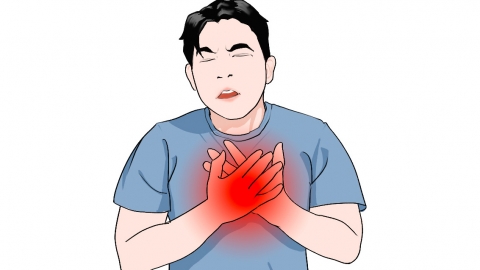What are the causes of chest tightness and shortness of breath due to alcohol?
Generally, chest tightness and shortness of breath caused by alcohol consumption may be due to factors such as increased cardiac load from vasodilation, airway irritation reactions, alcohol allergy, alcoholic cardiomyopathy, or angina. It is recommended to seek timely medical attention, identify the underlying cause, and receive symptomatic treatment under a physician's guidance. Detailed explanations are as follows:

1. Increased cardiac load due to vasodilation: After alcohol enters the body, it dilates peripheral blood vessels, reducing venous return to the heart. The heart must work harder to maintain blood supply, increasing myocardial oxygen demand, which can lead to chest tightness and shortness of breath accompanied by tachycardia, occurring shortly after drinking. Immediately stop drinking, rest in bed, drink warm sugared water appropriately to promote alcohol metabolism, avoid strenuous activity, and symptoms will gradually subside once vascular constriction function recovers.
2. Airway irritation reaction triggered by alcohol: Alcohol vapors can irritate the throat and airway mucosa, causing mucosal congestion and edema, narrowing the airway, obstructing ventilation, and resulting in chest tightness and shortness of breath accompanied by throat discomfort and coughing, which may occur during or immediately after drinking. Remove yourself from the alcohol environment, rest in a well-ventilated area, drink plenty of warm water to alleviate mucosal irritation, and use oxygen therapy if necessary to improve ventilation and reduce airway spasms.
3. Alcohol allergy: Individuals allergic to alcohol components may trigger an immune response after drinking, releasing substances like histamine, causing airway constriction and increased vascular permeability, leading to chest tightness and shortness of breath accompanied by skin itching and rash, with severe cases developing laryngeal edema. Immediately stop alcohol exposure and follow medical advice to use antiallergic medications such as loratadine tablets, cetirizine hydrochloride drops, or dexamethasone sodium phosphate injection. In cases of severe laryngeal edema, a tracheotomy may be required to maintain airway patency and prevent suffocation.
4. Alcoholic cardiomyopathy: Long-term heavy alcohol consumption damages myocardial cells, reducing cardiac contractility and output, causing chest tightness and shortness of breath accompanied by fatigue and leg edema, worsening with activity and having a longer disease course. Complete abstinence from alcohol is essential to prevent further cardiac damage. Follow medical advice to use medications such as coenzyme Q10 tablets, vitamin B1 tablets, and captopril tablets to nourish the myocardium and improve cardiac function. Additionally, limit salt intake to reduce cardiac load.
5. Angina pectoris: Alcohol-induced coronary artery spasm or sudden increase in myocardial oxygen demand can trigger angina, manifesting as chest tightness and shortness of breath, with retrosternal compressive chest pain accompanied by sweating, which can be relieved by rest or sublingual nitroglycerin. Immediately stop all activity, take nitroglycerin sublingually to dilate the coronary arteries, and follow medical advice to use medications such as aspirin enteric-coated tablets and metoprolol tartrate tablets to prevent future episodes. Patients with severe coronary artery stenosis may require coronary stent implantation to open narrowed vessels and improve myocardial blood supply.
In daily life, alcohol consumption should be avoided as much as possible, especially for individuals with heart disease or a history of allergies, who must strictly abstain. If chest tightness and shortness of breath occur after drinking, stop drinking immediately and rest, documenting symptom duration and associated manifestations to provide reference for medical evaluation. Maintain a regular routine, engage in moderate exercise to enhance cardiopulmonary function, and minimize alcohol's harmful effects on the body.








